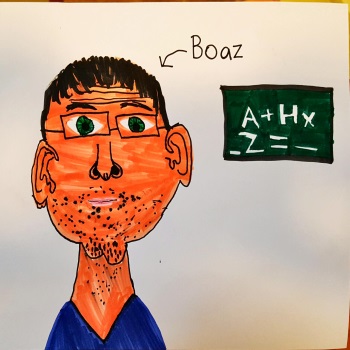
Drawing by Alma Barak
Boaz Barak
(In Hebrew: בועז ברק , how to pronounce)Gordon McKay Professor of Computer Science, Harvard John A. Paulson School of Engineering and Applied Sciences
(short bio)| Email: | |
| For Harvard (non DUS) related mails, please use For DUS related mails use cs-dus@seas.harvard.edu. | |
| Please use or for reference letter or manuscript review requests respectively. | |
| Quick Links: |
ML Foundations | AI Safety | Intro TCS | Crypto | Complexity |
I am a professor of Computer Science at Harvard University, as well as a member of the technical staff at OpenAI. Previously, I was a principal researcher at Microsoft Research New England, and before that I was an associate professor (with tenure) at Princeton University’s Computer Science department. I hold a Ph.D from the Weizmann Institute of Science, and was a postdoctoral fellow at the Institute for Advanced Study in Princeton.
Starting in the Fall of 2025 I will be part time at Harvard as a Catalyst Professor and part time at OpenAI.
I am a theoretical computer scientist, and have worked on computational complexity, algorithms, cryptography, quantum computing. In recent years my focus has been onfoundations of machine learning and safety of artificial intelligence systems.
See also my curriculum vitae and brief bio. I also occasionally blog and tweet.
Current activities: Member of the editorial board of the Theory of Computing Journal (ToC) and the Electronic Colloquium of Computational Complexity. I am a member of the scientific board of the Simons Institute for the Theory of Computing. I am a co organizer of the Harvard Machine Learning Foundations seminar and a steering committee member and associate faculty of the Kempner Institute for the Study of Natural and Artificial Intelligence. Board member and co organizer of Addis Coder as well as Jam Coders. I am also a member of the advisory board of the wonderful Quanta magazine. See my CV for past activities.
Current students: Gustaf Ahdritz, Depen Morwani, Rosie Zhao, Natalie Abreu
Former students: Yueqi Sheng, Sharon Goldberg (co advised with Jennifer Rexford), David Xiao (co advised with Avi Wigderson), Mohammad Mahmoody, Moritz Hardt, Zhixian Lei, Preetum Nakkiran (co-advised with Madhu Sudan), Yamini Bansal (co-advised with David Cox), Chi-Ning Chou, Prayaag Venkat, Gal Kaplun.
Current postdocs: Nikhil Vyas, Samy Jelassi. I also work closely with Kempner Institute research fellows
Former postdocs: Benny Applebaum, Thomas Holenstein, Guy Rothblum, Tselil Schramm.
Former interns: Moritz Hardt, Jonah Sherman, Yuan Zhou, Li-Yang Tan , Aaron Sidford, Aaron Potechin, Pravesh Kothari, Sam Hopkins.
Funding: I am currently supported by a Simons Investigator Fellowship, the Kempner Institute, NSF grant DMS-2134157, DARPA grant W911NF2010021,and DOE grant DE-SC0022199. I am also grateful for support from Oracle Labs and past support by the NSF, as well as the Packard and Sloan foundations and the BSF.
Want to work with me? At the moment I am not looking for students or postdocs to advise on my own, though am open to potentially co advising. I am interested in machine learning foundations. In particular see the opportunities sections of the ML foundations and the Kempner Institute websites. You can see this page for how to apply for graduate studies in computer science; we also have a new Quantum Science and Engineering program. Please do not email me with your resume - if you are interested in working with me, you can indicate this on your application and it will get to me. We also have some postdoc positions in both the foundations of Machine Learning and theoretical CS. I typically announce any such positions on my blog or Twitter, and post TCS positions on the TCS jobs page. ...
Personal: I am married to Ravit Barak.